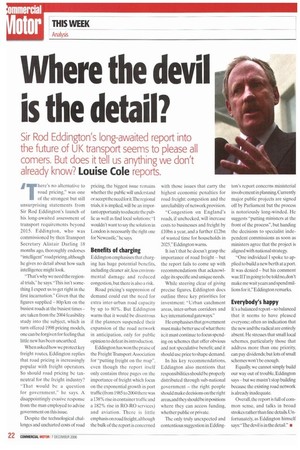Where the devil is the detail?
Page 22

If you've noticed an error in this article please click here to report it so we can fix it.
Sir Rod Eddington's long-awaited report into the future of UK transport seems to please all corners. But does it tell us anything we don't already know? Louise Cole reports.
I, T here's no alternative to road pricing," was one of the strongest but still unsurprising statements from Sir Rod Eddington's launch of his long-awaited assessment of transport requirements beyond 2015. Eddington, who was commissioned by then Transport Secretary Alistair Darling 18 months ago, thoroughly endorses "intelligent" road pricing, although he gives no detail about how such intelligence might look.
"That's why we need the regional trials," he says. "This isn't something I expect us to get right in the first incarnation." Given that the figures supplied 80p/km on the busiest roads at the busiest times are taken from the 2004 feasibility study into the subject. which in turn offered 1998 pricing models, one can be forgiven for feeling that little new has been unearthed.
When asked how we protect key freight routes, Eddington replies that road pricing is increasingly popular with freight operators. So should road pricing be taxneutral for the freight industry? "That would be a question for government," he says. A disappointingly evasive response from the man employed to advise government on this issue.
Despite the technological challenges and uncharted costs of road pricing, the biggest issue remains whether the public will understand or accept the need for i t. The regional trials, it is implied, will be an important opportunity to educate the public as well as find local solutions: "I wouldn't want to say the solution in London is necessarily the right one for Newcastle," he says.
Benefits of charging
Eddington emphasises that charging has huge potential benefits, including cleaner air, less environmental damage and reduced congestion. but there is also a risk.
Road pricing's suppression of demand could cut the need for extra inter-urban road capacity by up to 80%. But Eddington warns that it would be disastrous if the planners suspended their expansion of the road network in anticipation, only for public opinion to defeat its introduction.
Eddington has won the praise of the Freight Transport Association for -putting freight on the map", even though the report itself only contains three pages on the importance of freight which focus on the exponential growth in port traffic (from 1985 to 2004 there was a 138% rise in conta iner traffic and a 182% rise in RO-RO services) and aviation. There is little emphasis on road freightalthough the bulk of the report is concerned with those issues that carry the highest economic penalties for road freight: congestion and the unreliability of network provision.
"Congestion on England's roads, if unchecked, will increase costs to businesses and freight by 1:10bn a year, and a further £12bn of wasted time for households in 2025," Eddington warns.
It isn't that he doesn't grasp the importance of road freight but the report fails to come up with recommendations that acknowledge its specific and unique needs.
While steering clear of giving precise figures, Eddington does outline three key priorities for investment: -Urban catchment areas, inter-urban corridors and key international gateways."
He emphasises that government must make hetteruse of what there is; it must continue to focus spending on schemes that offer obvious and not speculative benefit; and it should use price to shape demand.
In his key recommendations. Eddington also mentions that responsibilities should he properly distributed through sub-national government the right people should make decisions on the right areas,and they should be in positions where they can access funding, whether public or private.
The only truly unexpected and contentious suggestion in Edding ton's report concerns ministerial involvement in planning.Currently major public projects are signed off by Parliament but the process is notoriously long-winded. He suggests "putting ministers at the front of the process", but handing the decisions to specialist independent commissions as soon as ministers agree that the project is aligned with national strategy.
"One individual I spoke to applied to build a new berth at a port. It was denied but his comment was: if I'm going to be told no,don't make me wait years and spend millions for it," Eddington remarks.
Everybody's happy
It's a balanced report-so balanced that it seems to have pleased everyone; often an indication that the new and the radical are entirely absent. He stresses that small local schemes, particularly those that address more than one priority, can pay dividends; but lots of small schemes won't be enough.
Equally, we cannot simply build our way out of trouble, Eddington says but we mustn't stop building because the existing road network is already inadequate.
Overall, the report is full of common sense, and talks in broad strokes rather than fine details. Unfortunately, as Eddington himself says:"The devilis in the detail." •


































































































































































































